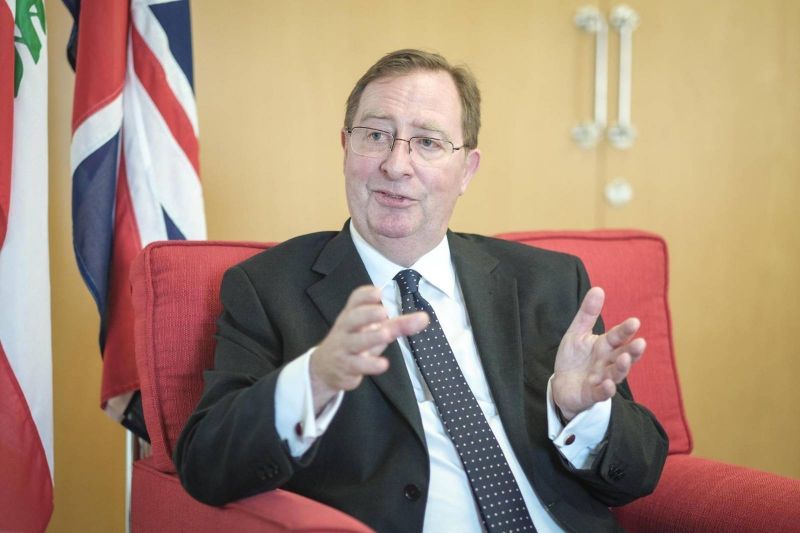Exclusive: Maritime agreement ‘signal of hope,’ says UK’s new ambassador to Lebanon

UK Ambassador to Lebanon Hamish Cowell speaks with L’Orient Today on Oct. 12, 2022. (Credit: João Sousa/L’Orient To
He also reiterated that a final deal for a multi-billion-dollar aid package from the International Monetary Fund (IMF), agreed upon at the staff level in April, is essential for Lebanon to dig its way out of a prolonged economic crisis. Cowell gave an exclusive interview to L’Orient Today and Annahar news outlets on Wednesday.
He called the maritime border deal, which could allow for new offshore Lebanese natural gas exploration, an “important agreement,” adding that he had congratulated Lebanese caretaker Foreign Minister Abdallah Bou Habib.“I know that the Lebanese authorities have been working extremely hard on this. I know our American friends have been working extremely hard on this. And as I think President Biden said [Tuesday], this is a historic achievement.”“The agreement comes at a crucial time for Lebanon,” Cowell added, “with the economic crisis, with all the difficulties that Lebanon is facing.”“I think that sends a signal of hope and signal of … potential income from hydrocarbons,” he said.
Under a leaked final draft of the maritime border agreement, Lebanon will gain control over the exploitation of the entire Qana field, with French company TotalEnergies to make a separate agreement with Israel to give them a share of revenues from it.
Though there are suspected gas reserves in Qana, it is not yet certain whether they are commercially viable to boost Lebanon’s ailing economy. Nevertheless, the maritime deal this week opens the door for an international consortium to explore — and potentially exploit the field.Meanwhile, the possibility of an IMF deal remains on top of the diplomatic agenda in Beirut, although it can seem that the government is scarcely paying attention to it as the months grind on with little progress since April’s staff-level agreement in April.
“The IMF deal, and the prior actions for the IMF deal, are absolutely essential to address the economic crisis in Lebanon,” he said. “And that’s exactly what I … discussed when I had my meeting with Prime Minister Mikati, and the president and the speaker.”Among the prerequisites for the deal are a capital control law, an updated banking secrecy law, a 2022 budget, financial system reorganization, a unified exchange rate, and debt restructuring, among other small and large measures.Cowell’s fellow ambassadors from the EU member states, plus Norway and Switzerland, recently penned an op-ed in L’Orient Today calling the IMF deal “the only realistic opportunity available today to get Lebanon out of the danger zone.” It’s a sentiment that Cowell echoed on Wednesday.
Read more:
Why Hezbollah gave the green light to an agreement with Israel
“The IMF deal is very important. In itself, it unlocks around about $3 billion, potentially,” Cowell said. “On its own, it’s not a magic wand because even that loan will not be enough to address all the challenges that Lebanon faces.
But what it would do is it would send a really important message that Lebanon has reached a turning point, that there’s a new direction.”Escaping Lebanon’s economic crisisCowell seems to view Lebanon’s economic crisis as internal in origin, and capable of resolution internally. It is a view he shares with his EU colleagues in the country, but which is contested by some voices in Lebanon that view the country as a victim of geopolitical forces larger than itself.Lebanon is situated “in a complicated neighborhood,” Cowell said. “And that’s undoubtedly true. [But] I don’t think it’s necessarily any more complicated than it was in the late 90s to 2000s, or in the 60s … when Lebanon was flourishing. And so Lebanon has managed to do well at certain points in time, even despite the complicated neighborhood,” he added.
Read more:
Aoun: Lebanon ‘approves’ maritime border agreement with Israel
Can Lebanon pull itself out of an economic collapse? “Actually, there’s an awful lot which Lebanon can do for itself, regardless of what the situation in the neighborhood is,” according to Cowell.“The economic crisis isn’t the result of outside forces, I don’t think. I think it’s very much a problem which is homegrown and which needs to be resolved internally … It’s easy to put all the blame on outside forces.
”On Lebanon’s trade potential, Cowell expressed hope that bilateral trade between Lebanon and the UK could grow.For his part, Hezbollah Secretary-General Hassan Nasrallah has repeatedly advocated for deemphasizing trade relations with the West, which he portrays as coming with strings attached. His party and businesses and individuals allegedly associated with it are under a suite of financial sanctions by many western states — the UK included.
Instead, Nasrallah has said Lebanon’s trading future could lie with other countries, including China, Russia and Iran.Asked about his view, Cowell said that Lebanese businesses are free to do business “with whomever they want, within the framework of sanctions.
” The UK, along with the United States and European states, maintains sanctions that pertain to different Chinese, Iranian and Russian individuals or entities.It’s “up to Lebanese businesses to choose where they want to trade. But [what] I would say is that, frankly, you have far more opportunities trading with Western countries, with Europe, with G7 countries, with America.”“Regardless of whether that’s [due to] sanctions or not, I think Lebanon’s opportunities lie to the west, in Europe, America.”
Source:today.lorientlejour.com/